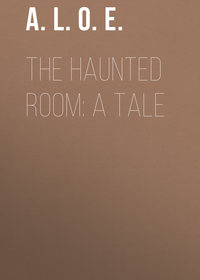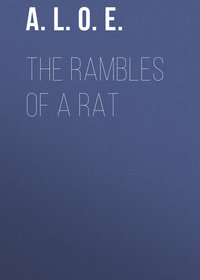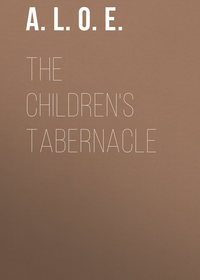 полная версия
полная версияHebrew Heroes: A Tale Founded on Jewish History
"He will rather frighten the Syrians," said the boy.
Many a time was that childish saying repeated in after-days, as if it had been prophetic, when Judah had long had rest from her foes, and Terah himself was an old man. When he sat beneath his own vine and fig-tree, no man making him afraid, he never wearied describing to his grand-children that form which had made the earliest impression which his memory had retained. He would speak with kindling enthusiasm of the princely man who had taken him in his arms and carried him on his shoulders – who had been as tender to a sick child, as he had afterwards been terrible to Israel's foes.
The sun had just sunk when the foot of the Asmonean trod the green valley of Sharon. It was well that from thence every step of the way was familiar to Judas, for he had soon no light but that of the stars to guide him. The wind was rising; it rustled amidst the tamarisks, and shook the leafy crests of the evergreen palms; it bore to the ear of the almost exhausted traveller the wild howl of the jackals, rising higher and higher in pitch, like the wail of a human being in distress. Weary indeed and footsore was the Asmonean, but still he bravely pressed forward, till at length he heard the welcome sound of the waves of the Mediterranean lashing the coast near which stood Modin, about an English mile from the town of Joppa.
Thankful was Judas to reach his father's home, where, the heavy strain upon his powers being for awhile relaxed, he slept the deep sweet sleep of the weary, after a journey which could have been accomplished on foot in a single day only by a man possessing great powers of endurance, as well as physical strength.
CHAPTER VII.
THE FIRST STRUGGLE
The arrival of Apelles, the emissary of Antiochus Epiphanes, had thrown the town of Modin into a state of great excitement. A proclamation was made in the morning of the following day, that all the inhabitants, men, women, and children, should assemble in the market-place at noon, to obey the mandate of the king, by worshipping at an altar of Bacchus, which was erected at that spot. "Curses, not loud but deep," were muttered in many a Hebrew home. Some of the Syrian soldiers had been quartered for the night with the inhabitants of Modin. The fatted calf had to be killed, the best wine poured out, for idolatrous guests whose very presence polluted a banquet. The Syrians repaid the reluctant hospitality of their hosts by recital of all the horrors of the persecution in Jerusalem. They told of the barbarities perpetrated on Solomona and her sons; shuddering women clasped their children closer to their bosoms as they heard how two mothers had been flung from the battlements at the south side of the Temple, with their infants hung round their necks, because they had dedicated those martyr babes to God in the way commanded by Moses. Such examples of cruelty struck terror into the hearts of all whose faith and courage were not strong. It was evident that Antiochus was terribly in earnest, and that if his wrath were aroused by opposition, the horrors which had been witnessed at Jerusalem might be repeated at Modin. The plea of terrible necessity half silenced the consciences of many Hebrews who secretly abhorred the rites of the heathen. A quantity of ivy was gathered, and twined by unwilling hands, to be worn in honour of the false deity whose worship was to be forced upon a reluctant people.
A lofty shrine on which was raised a marble image of the god of wine, with his temples crowned with ivy, a bunch of grapes in his hand, and sensuality stamped on every feature, was erected in the centre of the market-place. Before it was the altar of sacrifice, and around this, as the hour of noon approached, collected a motley crowd. There were the white-robed priests of Bacchus, with the victims chosen for sacrifice. Men of war, both on foot and on horseback, formed a semicircle about the shrine, to enforce, if necessary, compliance with the decree of the Syrian monarch. Apelles himself, magnificently attired, with tunic of Tyrian purple, jewelled sandals, and fringes of gold, sat on a lofty seat on the right side of the altar, awaiting the appointed time when the sun should reach his meridian height. Numbers of people filled the market-place, of both sexes, and of every age, for the soldiery had swept through Modin, forcing all the inhabitants to quit their dwellings and assemble to offer sacrifice upon the altar of Bacchus.
Directly opposite to the altar there was one group of Hebrews conspicuous above all the rest, and towards this group the eyes of the assembled people were frequently turned. There stood Mattathias, with snowy beard descending to his girdle – a venerable patriarch, surrounded by his five stalwart sons. There appeared Johannan, the first-born; Simon, with his calm intellectual brow; Eleazar, with his quick glance of fire; Jonathan; and Judas, third in order of birth, but amongst those illustrious brethren already first in fame. In stern silence the Asmonean family watched the preparations made by the Syrian priests to celebrate their unhallowed rites. Not a word escaped the lips of the Hebrews; they stood almost as motionless as statues, only their glances betraying the secret indignation of their souls.
Mattathias, as a direct descendant of Aaron through Phineas, and a man of great wisdom and spotless integrity, possessed great influence within his native city of Modin. Disputes were referred to his decision, his judgment was appealed to in cases of difficulty, and his example was likely to carry with it greater weight than that of any other man in Judaea. Apelles was perfectly aware of this. "Mattathias once gained, all is gained," the Syrian courtier had said to the king before departing on his mission to Modin; "the old man's sons have no law but his will, and if the Asmoneans bow their heads in worship, all Judaea will join in offering sacrifice to your gods."
Anxious to win over by soft persuasions the only Hebrews whose opposition could cause any difficulty in the execution of the king's commands, when the hour for offering sacrifice had almost arrived, Apelles descended from his seat of state, and approached the Asmonean group. This unexpected movement of the Syrian awakened eager attention amongst the assembled crowds.
"Venerable Mattathias," said Apelles, saluting the old man with stately courtesy, "your high position, your wide-spread fame, entitle you to the place of leader in performing the solemn act by which Modin at once declares her fealty to our mighty monarch, Antiochus Epiphanes, and her devotion to the worship of Bacchus. Now, therefore, come you first and fulfil the king's commandment, like as all the heathen have done, yea, and the men of Judah also, and such as remain at Jerusalem; so shall you and your house be in the number of the king's friends, and you and your children shall be honoured with silver and gold and many rewards." When the Syrian had ceased speaking, the silence amongst the expectant people was so profound that the roll of the billows on the beach, and the scream of a white-winged sea-bird, could be distinctly heard.
Sternly the old man had heard Apelles to the end; then fixing upon him the keen eyes which flashed under the white overhanging brows, like volcano fire bursting from beneath a mountain crest of snow, he replied, in tones so loud that they rang all over the market-place, "Though all the nations that are under the king's dominion obey him, and fall away every one from the religion of their fathers, and give consent to his commandments, yet will I and my sons and my brethren walk in the covenant of our fathers. God forbid that we should forsake the law and the ordinances! We will not hearken to the king's words to go from our religion, either on the right hand or the left."
Hardly had the brave words died on the ears of those who heard them, when, in strange contrast, there sounded a hymn in honour of Bacchus, and, gaily dressed and crowned with ivy, a wretched apostate Jew, eager to win the king's favour by being the first to obey his will, came forward singing towards the altar. All the blood of Phineas boiled in the veins of his descendant; was the Lord of Hosts to be thus openly insulted, His judgments thus impiously defied! Forward sprang the old Asmonean, as if once more endowed with youth, one moment his dagger glittered in the sunlight, the next moment the apostate groaned out his soul upon the altar of Bacchus!
To execute justice in this summary manner, and before all the people, was indeed to draw the sword and throw the scabbard away. A fierce shout for vengeance arose from the Syrian soldiers, and their ranks closed around Mattathias, but not around him alone. Not for a minute had his sons deserted his side, and now, like lions at bay, they united in the defence of their father. Nor were they to maintain the struggle unaided. There were Hebrews amongst the assembled crowds to whom the voice of Mattathias had been as the trumpet-call to the war-horse; there were men who counted their holy faith as dearer than life. These, with shouts, rushed to the rescue, and the market-place of Modin became the scene of a hand-to-hand desperate struggle, where discipline and numbers on the one side, devotion, heroism, and a good cause on the other, maintained a fearful strife. Though sharp, it was but a brief one. The fight was thickest near the altar – around it flowed the blood of human victims; there the powerful arm of Judas laid Apelles lifeless in the dust. This was the crisis of the struggle, for at the fall of their leader the Syrians were seized with sudden panic. The horses, whose trappings had glittered so gaily, were either urged by their riders to frantic speed, or dashed with emptied saddles through the throng, to carry afar the news of defeat. Flight was all that was left to the troops of Antiochus or the priests of Bacchus, and few succeeded in making their escape, for many Jews who had stood aloof from the struggle joined in the pursuit. The very women caught up stones from the path to fling at the flying foe; children's voices swelled the loud shout of triumph. The altar of Bacchus was thrown down with wild exultation; the idol was broken to pieces, and its fragments were rolled in the blood-stained dust. Those Jews who had shown most fear an hour before, now by more furious zeal tried to efface from other minds and their own the memory of their former submission. One spirit seemed to animate all – the spirit of freedom! Modin had arisen like Samson, when he snapped the green withes and went forth to the fight with the strength of a giant.
But this was an ebullition of zeal likely to be more fiery than lasting. Mattathias little trusted that courage which only follows in the train of success. The old man knew that the struggle with the power of Syria was only commencing; that it would probably be long protracted, and that it would be impracticable to defend Modin against the hosts which would soon be sent to assail it. The patriarch stood in the centre of the market-place, with his foot on the fragments of the broken altar, and once more his loud clear voice rang far and wide. "Whosoever is zealous of the law, and maintaineth the Covenant, let him follow me! Let us away to the mountains, ye men of Judah!"
How many of the inhabitants of Modin obeyed the call? how many resolved to leave city and home, to dwell with the beasts in the caves of the mountains? History relates that but a little band of ten, inclusive of the Asmoneans, by retiring to the fastnesses of the mountains, formed the nucleus of that brotherhood of heroes who were to wrest victory after victory from the hosts of Syria, and win that unsullied fame which belongs only to those who display firm endurance and devoted courage in a righteous and holy cause.
CHAPTER VIII.
HADASSAH'S GUEST
In no place were the tidings of the rising at Modin received with greater exultation than in the lonely dwelling of Hadassah. The Hebrew widow could hardly refrain from taking down the timbrel from the wall, and bursting, like Miriam, into song. "Sing unto the Lord, for He hath triumphed gloriously! He hath dashed to pieces the enemy!"
Constant information of what was occurring, every rumour, true or false, whether of victory or of failure, was brought to Hadassah by her son-in-law, Abishai, who little dreamed that every word which he uttered was overheard by the wounded Athenian, from whom he was divided but by the partitioning curtain!
In one of his visits to Hadassah, Abishai told how Judas had in the mountains raised a standard, which bore the inscription, "Who is like unto Thee among the gods, O Jehovah!"
"It is said," observed Abishai, "that from the initial letters of this inscription the word MACCABEUS is formed, and that by this new title Judas is commonly called; it is a name which the Syrians will soon have cause to dread."
"It is a well-chosen name!" cried Hadassah. "Let the Asmonean be called Makke-baiah (a conqueror in the Lord), for doubtless the God whom he serves will give to him the victory!"
The triumphant joy of the patriotic Hadassah received a painful check when she heard some time afterwards from Abishai of the grievous sacrifice of the lives of a thousand faithful Hebrews, who had taken refuge in a cave at no great distance from Jerusalem. Being attacked there on the Sabbath-day by the Syrians, these Hebrews had actually let themselves be slaughtered without resistance, rather than incur sin (as they thought) by breaking the Fourth Commandment! Grieved at this waste of precious life, it was a relief to Hadassah to learn that such a sacrifice to a mistaken sense of duty would not be repeated; for when the tidings had reached Mattathias and his sons, they had bitterly mourned for their slaughtered countrymen, and had said one to another, "If we all do as our brethren have done, and fight not for our lives and laws, against the heathen, they will quickly root us out of the earth." A decree, therefore, was sent forth from the camp in the mountains, that to Hebrews attacked on the Sabbath-day, self-defence was lawful and right.
In the meantime, under the care of Hadassah, the wounds of Lycidas were gradually healing. Never to any man had confinement and suffering been more sweetened, for was he not near to Zarah; did he not hear the soft music of her voice, breathe the same air, even see her light form gliding past the entrance of his hiding-place, though the maiden never entered it? The necessity of concealing the presence of Lycidas, above all from the blood-thirsty Abishai, compelled the closing during the daytime of the door at the back of the dwelling which opened on the small piece of ground behind. Peasants or travellers would occasionally, though rarely, come to fill their pitchers or slake their thirst at the little fountain gushing from the hill, and had the door of what Lycidas playfully called his "den" been open, there would have been nothing to prevent strangers from seeing or entering within. The whole ventilation of the confined space occupied by the invalid depended therefore during the day-time on its communication with the front room, which might be called the only public apartment, and in which not only food was now prepared and taken, and the occasional guest received, but in which the Hebrew ladies pursued their daily avocations. Here Zarah would pursue her homely occupation of spinning, and Hadassah copy out on rolls of vellum portions from the Law and the Prophets. This latter occupation was fraught with peril; and had Hadassah been discovered in the act of transcribing from the sacred pages, it might have cost her her life. Antiochus had eagerly sought to destroy all copies of the Scriptures, or to profane them by having vile pictures painted on the margins. To possess – far more to copy out – God's Holy Word was now a capital offence. But the faith of Hadassah seemed to raise her above all personal fear; the peril connected with her pious labours made her but more earnestly pursue them. The presence of the young Gentile in her dwelling was a source of far greater uneasiness to the widow, than any danger which threatened herself.
Had Hadassah been able to seclude her patient entirely, she would willingly have discharged the duties of hospitality towards him; but such seclusion the scanty accommodation of her dwelling would have rendered impossible, even had Lycidas been willing to submit to perfect isolation. But this was by no means the case. Not only did he require the curtain frequently to be drawn back to enable him freely to breathe; but the Greek, as his strength increased, was eager to be seen as well as to see, and to speak as well as to listen. No anxious warnings of danger to be apprehended from the sudden entrance of Abishai could prevent Lycidas from dragging his languid limbs beyond the limits which the curtain defined, and joining in social converse. Lycidas resolutely shut his eyes to the fact that, to his hostess at least, his presence was unwelcome. He deceived himself into the belief that he was rather repaying the kindness which he had received, by lightening the dulness of the secluded lives led by the Hebrew ladies. The young Athenian drew forth for their amusement all the rich stores of his cultivated mind. Now he recited wondrous tales of other lands; now gave vivid descriptions of adventures of his own; poetry flowed spontaneously from his lips like a stream – now sparkling with fancy, now deepening into pathos; Lycidas had in Athens been compared to Apollo, as much for his mental gifts as his singular personal beauty.
To the brilliant conversation of the stranger, so unlike what she ever had heard before, Zarah listened with innocent pleasure. She was ever obedient to her aged relative, and often did Hadassah's bidding in the upper rooms of the dwelling, even when it seemed to the maiden that she was sent on needless errands; but the light form, in its simple blue garment, with the long linen veil thrown back from the graceful head, was always returning to the apartment, to which it was drawn by a new and powerful attraction. If Hadassah sometimes appeared irritable and imperious towards the fair young being whom she loved, it was because her mind was disturbed, her rest broken by anxieties which she could impart to no one. The aged lady scarcely knew which evil she most dreaded: the discovery of Lycidas by Abishai – a discovery which would inevitably stain her threshold with blood – or the long sojourn under her roof of the dangerous stranger, whom she had unwillingly admitted, and now more unwillingly retained in her home.
CHAPTER IX.
DEATH OF MATTATHIAS
Wild was the life led by Mattathias and his followers in the mountains – a life of danger and hardship; danger met manfully, hardship endured cheerfully. Amongst wild rocks, heaped together like the fragments of an elder world torn asunder by some fearful convulsion of Nature, the band of heroes found their home. Where the hyaena has its den, and the leopard its lair; where the timid wabber or coney hides in the stony clefts, there the Hebrews lurked in caves, and manned the gigantic fastnesses which no human hands had reared, and from which it would be no easy task for any enemy to dislodge them.
The small band that had rallied round Mattathias when he withdrew from Modin, had been soon joined by other bold and zealous sons of Abraham, and the mountains became a place of refuge to many who fled from persecution. As numbers increased, so did the difficulty of procuring means of subsistence. The Asmoneans and their followers chiefly lived upon roots. The less hardy of the band suffered severely from the chill of the frosts, the keenness of the sharp mountain air, the sharp winds that blew over snow-clad heights. But no voice of complaint was heard. Frequent forays were made into the plains; idol-altars were thrown down, forts were burnt, detachments of Syrians cut off. None of the enemy within many miles of the rocky haunts of the Asmoneans lay down to rest at night feeling secure from sudden attack during the hours of darkness; and oft-times the early morning light showed a heap of smouldering ruins where, on the evening before, the banners of Syria had waved on the walls of some well-manned fortress.
To the bold spirit of Maccabeus there was something congenial in the adventurous kind of existence which he led, and yet he was not one who would have adopted a guerrilla life from choice. As even in a hard and rocky waste there are spots where rich vegetation betrays some source of hidden nourishment below, and they who dig deep enough under the surface find a spring of bright pure living waters, – so deep within the Asmonean's heart lay a hidden source of tenderness which prevented his nature from becoming hardened by the stern necessities of warfare. This secret affection made the warrior more chivalrous to women, more indulgent to the weak, more compassionate to all who suffered. In the moment of triumph, "Will not Zarah rejoice?" was the thought which made victory more sweet; in preservation from imminent danger, the thought, "Zarah has been praying for me," made deliverance doubly welcome. When the evening star gleamed in the sky, its pure soft guiding orb seemed to Judas an emblem of Zarah; as he gazed on it, the warrior would indulge in delicious musings. This desperate warfare might not last for ever. If the Lord of Sabaoth should bless the arms of His servants; might not the time come when swords should be beaten into ploughshares, when children should play fearlessly in pastures which no oppressor's foot should tread, and the sound of bridal rejoicings be heard in the land of the free? Hopes so intensely delightful would then steal over the Asmonean's soul, that he would suddenly start like a sentinel who finds himself dropping asleep on his post. How dared the leader of Israel's forlorn hope indulge in reveries which made him feel how precious a thing life might be to himself, when he had freely devoted that life to the service of God and his country? When David was engaged in rescuing his flock from the lion and the bear, did he stop to gather the lilies of the field? "It is well," thought Judas Maccabeus, "that I have never told Zarah what is in my heart; if I fall, as I shall probably fall, on the field of conflict, I would not leave her to the grief of a widow."
An event was at hand which was felt as a heavy blow by all to whom the cause of Israel was dear, but more especially so by the Asmonean brethren, who from their childhood had regarded their father with reverence and affection.
Mattathias was an aged man, and though his spirit never sank under toil and hardship, his constitution soon gave way under their effects. The patriarch felt that his days, nay, that his hours, were numbered, and summoned his sons around him to hear his last wishes, and to receive his parting blessing.
In a cave near the foot of a mountain, stretched upon a soft couch of skins of animals slain in the chase, lay the venerable man. The pallor of death was already on his face, but its expression was tranquil and calm. The aged pilgrim looked like one who feels indeed that he has God's rod and staff to lean on while he is passing through the valley of the shadow of death. The full glare of noonday was glowing on the world without, but softened and subdued was the light which struggled into the cave, and fell on the form of the dying man, and the stalwart figures of the Asmonean brothers bending in mute sorrow around their honoured parent.
Mattathias bade his sons raise him a little, that he might speak to them with more ease. Jonathan and Eleazar, kneeling, supported him in their arms; while their three brothers, in the same attitude of respect, listened silently at his side to the patriarch's farewell address.
I shall not dare to add words of my own to those which the historian has preserved as the dying utterances of this noble old man – a hero, and the father of heroes. I give them as they fell upon the ears of Judas Maccabeus and his brothers, who received them as Joseph received the parting blessing of Israel.
"Now hath pride and rebuke gotten strength, and the time of destruction, and the wrath of indignation. Now, therefore, my sons, be ye zealous for the law, and give your lives for the covenant of your fathers. Call to remembrance what acts our fathers did in their time, so shall ye receive great honour and an everlasting name.
"Was not Abraham found faithful in temptation, and it was imputed unto him for righteousness. Elias, for being zealous and fervent for the law, was taken up into heaven. Ananias, Azarias, and Misael, by believing, were saved out of the flame. Daniel, for his innocence, was delivered from the mouth of the lion. And thus, consider ye, throughout all ages, that none that put their trust in Him shall be overcome. Wherefore, ye my sons, be valiant, and show yourselves men in behalf of the law; for by it ye shall obtain glory."





